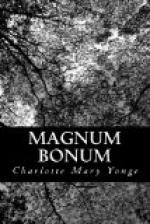“I call this dreary,” said the mother. “We don’t seem to get a bit nearer the lake. I shall go home and write to Babie.”
“I’ll come back with you,” said Johnny. “My mother will be looking for a letter.”
“Not giving in already, Johnny,” said Armine. “I can tell you I mean to get to the lake.”
“The Friar is the slave of his note-book,” said Jock. “When are we to have it-’Crags and Cousins,’ or ’From Measles to Mountains’?”
“I don’t want to forget everything,” said Johnny, with true Kencroft doggedness.
“Do you expect ever to look at that precious diurnal again?”
“He will leave it as an heirloom to his grandchildren!”
“And they will say how slow people were in the nineteenth century.”
“There will have been a reaction by that time, and they will only wonder how anybody cared to go up into such dreary places.”
“Or perhaps they will have stripped them all, and eaten the glaciers up as ices and ice-creams!”
“I think I’ll set up that as my pet anxiety,” said their mother, laughing; “just as some people suffer from perplexity as to what is to become of the world when all the coal is used up! You are not turning on my account, are you, Johnny? I am quite happy to go back alone.”
“No, indeed. I want to write my letter, and I have had enough,” said John.
“Tired!” said Armine. “Poor old monk! Swiss air always makes me feel like a balloon full of gas. I could go on, up and up, for ever!”
“Well, keep to the path, and don’t do anything imprudent,” she said, turning back, the boys saying, “We’ll only have a look down the pass! Here, Chico! Chico! Chick! Chick!”
Chico, the little dog so disdainfully rejected by Elvira, had attached himself from the first to Jock. He had been in the London house when they spent a day there, and in rapture at the meeting had smuggled himself, not without his master’s connivance, among the rugs and wrappers, and had already been the cause of numerous scrapes with officials and travellers, whence sometimes money, sometimes politeness, sometimes audacity, bought off his friends as best they could.
There was a sort of grave fascination in the exceeding sternness of the scene-the grey heaps of stone, the mountains raising their shining white summits against the blue, the dark, fathomless, lifeless lake, and the utter absence of all forms of life. Armine’s spirit fell under the spell, and he moved dreamily on, hardly attending to Jock, who was running on with Chico, and alarming him by feints of catching him and throwing him into the water.
They came to the gap where they expected to look over the pass, but it was blotted out by a mist, not in itself visible though hiding everything, and they were turning to go home when, in the ravine near at hand, the white ruggedness of the Wildstrube glacier gleamed on their eyes.




